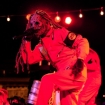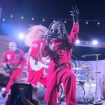This story was originally published in October 2014.
"You know, man, it's kind of a weird, long story," says Slipknot guitarist Jim Root, taking a thoughtful drag on a cigarette outside his room at Hollywood's historic Roosevelt Hotel. "But it always is with us, isn't it? Nothing's ever normal with us."
We're talking about the making of the Slipknot's fifth and latest studio album, .5: The Gray Chapter, but Root has a point: The Slipknot saga has always been a complex one, even well before the masked metal band emerged from Des Moines, Iowa, in 1999 with their fearsome self-titled debut. And yet, despite the collective conflicts and individual distractions that have surfaced over the years, the nine 'Knot members that recorded 1999's Slipknot — vocalist Corey Taylor, guitarists Jim Root and Mick Thomson, bassist Paul Gray, drummer Joey Jordison, percussionists Shawn "Clown" Crahan and Chris Fehn, DJ Sid Wilson, and sampler/keyboardist Craig Jones — managed to stick together for over a decade, recording three more brilliant studio albums, successfully making an against-all-odds ascent to the upper echelons of the rock world in the process.
But the band suffered a huge blow in May 2010, when Gray died of an accidental drug overdose. Then, in December 2013, Jordison split with Slipknot for reasons that have yet to be fully explained. Evidence of additional cracks in the structure appeared to surface this past May, when it was revealed that Root had parted ways on less than amicable terms with Stone Sour, the band he and Taylor had played in together dating back to 1995, years before either of them were in Slipknot. With only seven members left, and new tensions flaring between at least two of the remaining members, one had to wonder: Was the 'Knot unraveling for good?
The band's new 14-track album answers that question with an emphatic "Fuck, No!" Bold tracks like "The Devil in I," "Sarcastrophe," "Killpop," and "Skeptic" seethe with the darkness and tension of classic Slipknot, yet pack a deeper emotional punch than anything the band has previously recorded. From the suspenseful drone of the opening "XIX" to the wrenching closer "If Rain Is What You Want," Slipknot's first studio album in six years shows that the band has remained true to its musical and artistic mission despite the various traumas that have rocked their ship over the past four-plus years. But to fully understand the record, you must first grasp the long, painful, and at times convoluted road that led to its creation. "This album is the story of everything we've gone through since 2010," says Taylor.
That story begins on May 24, 2010, the day that Paul Gray was found dead in an Urbandale, Iowa, hotel room. "That was probably one of the hardest days that I ever had, if not the hardest day," Taylor remembers. "A lot changed that day for us, you know?"
Having co-founded Slipknot in 1995 with Shawn Crahan, Gray had literally been there from the beginning, his songwriting shaping a major chunk of Slipknot's musical output. "Paul was the essence of Slipknot," said Crahan at the time of Gray's passing, and in many ways he was the heart of the band, as well—by all accounts, Gray was the fractious band's good-natured diplomat, who was never happier than when he and his brothers were all kicking ass together. It took a while for the band to decide to carry on without him; when they finally returned to the stage in the summer of 2011 for the Sonisphere festival, Gray's jumpsuit, pig mask, and bass were placed conspicuously on a stand in his usual position in front of the drums, while original Slipknot guitarist Donnie Steele played the bass parts from behind Jordison's kit. The band found the shows to be a cathartic and positive experience, which made the prospect of making another record seem, at the very least, within the realm of possibility.
"Those first Sonisphere shows showed us that it's just as important for us to continue as it is for the fans," says Taylor. "After that, it was like, 'Let's give it a little time, and let the time for us to come back and make a record come to us naturally.'"
Of course, different members of the band had different ideas about what "give it a little time" meant. As early as late 2010, Jordison was already telling journalists that a new record was "in motion," but several years, numerous live shows (including the inaugural Knotfest festival in 2012), and one "greatest hits" package (2012's Antennas to Hell) came and went without any actual Slipknot recording activity. It was a situation that Jim Root — who along with Taylor devoted much of 2012 and 2013 to the recording and touring of Stone Sour's critically acclaimed House of Gold & Bones Part 1 and Part 2—found increasingly frustrating.
"It became apparent to me near the end of the album cycle for House of Gold & Bones that it had basically run its course," the guitarist says. "But the band kept pushing for more dates, and I was just like, 'It's time to stop!' Slipknot made it possible for Stone Sour to have everything that it has — and there were people in Slipknot that have been sitting idly waiting to do a new album. And I had fans asking me every day, 'When are you doing Slipknot?' It just seemed like it was in the air."
After continually "waving the flag" for a new Slipknot record, Root finally got his wish in late 2013, though not exactly in the manner he'd hoped for. "I guess you could say I was 'given the opportunity' to start the Slipknot album, to put it sort of nicely," he chuckles wryly. "Essentially in November, I found out that Stone Sour wanted to do some more shows and they didn't want me to be a part of it."
Thus relieved of his Stone Sour duties, Root busied himself writing new Slipknot material on his laptop at his home in Florida. "I had so many emotions going on in my head when I was writing this shit," he says. "I was mad because Stone Sour wanted to go do a tour and they didn't want me to be a part of it. So I had a little anger, and I had a little bit of fucking depression. I was kind of hurt. But at the same time, it was probably all for the better, because I wasn't really happy in that band any more…
"I love Stone Sour, I love the music that we created, and it was a fun ride," he continues. "But if I'm going to sacrifice all of my free time and my life for something, it has to be something that I a thousand-percent believe in, and something where I have a thousand-percent communication with everyone involved. And that something is Slipknot."
Since joining the 'Knot in 1998, Root had been deeply enmeshed with the band's writing process. "It was always basically me, Paul, and Joe hashing shit out," he explains. "If I would be on tour with Stone Sour, Joey and Paul would get together and demo 20 songs or so, and then I would get together with Paul and Joey after I got off the road, and I would put my two cents into whatever they had, learn whatever they had, and bring whatever other material I had to the table."
This time, however, there was no Gray — and, much to Root's surprise, no Jordison, who, during Slipknot's downtime, had started a new band, Scar the Martyr. "Shit just sort of changed overnight with that," he says. "It was very fucking bizarre. I was planning on getting together with Joe to write, but I would hear from our manager that, 'No, Joe doesn't want to write. He wants to write another Scar the Martyr album, and he wants to tour for another year.' Which was making me go crazy, because that was going to push a Slipknot record that was already a year behind another year behind!"
What exactly transpired between Jordison and Slipknot remains murky beyond the group's December 2013 announcement that he and the band had parted ways for "personal reasons," and Jordison's subsequent Facebook post asserting that he didn't quit Slipknot. When asked to comment further on the subject, Root politely declines. "Someday I might be able to talk about it, but right now I think everything has to just go the way it's going in order for us to continue," he says.
Taylor, likewise, opts for a vague outline of the Jordison situation. "The only thing I can really say is that, sometimes one person's going one way and you're going the other way, and as much as you can try to go in the same direction, it doesn't always work that way," he explains. "It was hard, but we did what we felt we had to do."
When Root sent his initial demos to Crahan, the Clown greeted them with immense enthusiasm. "Jim got busy, and he created art, man," Crahan enthuses. "Right away, I could tell that it was more than I could immediately wrap my brain around!" He and Root began bouncing ideas back and forth over email and, in the guitarist's words, "that's when the ball really started rolling." Root may have also had additional creative help, however.
"It's weird, man," he says. "I'm not a very spiritual person, so when somebody loses someone who's close to them and says that they're still with them, I've always thought that was bullshit or whatever. But I was out in the garage and working on an arrangement for a song that turned into either 'The Devil in I' or 'Sarcastrophe.' Normally when I write, I throw down the first thing I come up with, then I double it, then I throw a bass on it, and then I put the drums around it. But on this arrangement, I noticed that I wasn't just throwing the riff down — I was trying different variations on it, trying different positions on the neck, and thinking about melodies while coming up with what the chord progression was going to be…
"I suddenly realized, Fuck, man! That's what Paul used to do! Paul was so meticulous. He would overthink everything, even if it was just how to get from one chord to the next chord. He would explore every possibility on the fretboard, especially if he was writing it on the guitar. And it made me go, He's here, man — he's helping me write this shit! And it blew my fucking mind. I had to put my guitar down, and I put my head in my hands. I was like, You fucker!"
Gray's spirit looms large over the new Slipknot album in other ways, as well. "There's a lot of pain on here, there's a lot of honesty, there's a lot of insight as far as what we've been through," says Taylor. "There's some anger, too. I mean, when you lose someone, there's naturally part of you that gets really angry that you lost them. At the same time, you kind of have to concede that you have to be happy for the time you got with that person. A lot of stuff is pointed inwardly, as well, because naturally there's a lot of survivor's guilt going on, like, 'What could I have done?' That's the burden of people left behind. You never get a good answer. All you can kind of do is make peace with it. And that's what a lot of this album is about — making peace with the loss that we've suffered."
"The circumstance of Paul's death is one emotional thing that we all needed to deal with," says Crahan. "It took time before I could walk in, make an album, and feel good about it. I still cried, man. We all shed tears. But it just felt so good to get in there and get it all out."
We've been compared to scream therapy so many times," adds Taylor, "and in a way, it was really great to be able to use that in a present tense. Not just exploding about things that happened in the past when we were younger, but real, adult stuff."
While past Slipknot recording sessions have been contentious at best, Crahan describes the studio experience for the band's new album in nothing less than glowing terms. "We had so much emotion, and so much freedom to create emotion," he says. "We worked so hard, but it was effortless! We created art that hurt, but we were able to have fun and and let good air and freedom in!"
While Root admits that it was "a little weird" writing music for Taylor to sing over in the initial wake of the Stone Sour fallout, both men say that they've since buried the hatchet. The other hurdle that the band had to jump, of course, was the question of what to do about the rhythm section — and while the id entity of the band's new drummer and bassist haven't been announced at press time, their work on the new album is quite impressive, even considering the large shoes they had to fill.
"We only ever played with one drummer," says Root. "We weren't really sure the guy was gonna work out, but he sat down and played 25 or 30 of ours from our past catalog. We were like, 'OK, this can probably work.' We spent like a month with those arrangements that I wrote at home — we put him in a room and Clown and I just put the screws to him. 'Try this! Do that! Can you do this?' And it was fucking rad, because he was coming up with shit that was blowing our minds."
The band also brought an as-yet-unnamed session bassist in for the recording sessions. Though he only tracked "six or seven songs" by Root's estimation (Root handled the rest of the bass duties), he — like the new drummer — will be coming on the road with the band for October's Knotfest and their other fall and winter dates. It's currently still undecided, however, what presence the bassist and drummer will have onstage.
"The drummer is obviously going to have to be visible," laughs Root. "But as far as the bass player, we're still talking about it. Does Paul's place never get filled? Is there always an empty spot on the stage where Paul was? Or do we give the new generation of fans nine guys out front? There are still a couple of guys in the band who, if they had it their way, would never have someone be onstage in that spot. But honestly, the more I think about it, I think we should just come out full-on with nine: 'Here we are, we're Slipknot, don't fucking judge us!'"
"At the end of the day, our focus is on the whole, and not just the pieces," adds Taylor. "This about the band — not about the brand. We want to make sure that we come back at a level that we expect from ourselves, which means that we're going to push it even further. So I hope people are ready. This is not a test, this is not a drill. This is us reestablishing dominance. And I can't fucking wait!"












